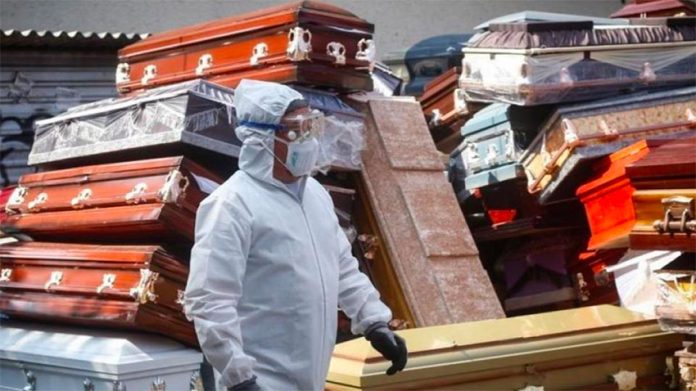Crematoriums and funeral homes in major cities are overflowing with bodies thanks to the acceleration of Covid-19 infections.
Mexico City’s 17 crematoriums told the newspaper Reforma that they are running extra shifts and performing cremations into the early hours of the morning and still can’t keep up with the demand. Some said they are running more than 48 hours behind schedule and that the situation is only worsening.
Typically, families receive ashes from a funeral home or crematorium on the same day or within 24 hours.
“This second wave [of the pandemic] is very worrying for the funerary sector. It’s alarming,” said David Vélez, president of the Association of Funeral Home Owners and Embalmers in Mexico City. “Although we have worked hand-in-hand with authorities to streamline all the necessary procedures, regrettably we can’t keep up with the demand.”
Vélez estimates that the number of dead in Mexico City has risen more than 100% since the city’s first wave of outbreaks.
The situation is similar in other cities: in Monterrey, Nuevo León, employees at the Protecto Deco Santa Catarina funeral home said that the delivery of ashes to families is now taking between 15 and 30 days. They said that another branch in the center of the city used to receive no more than five bodies per day, and now it seeing 10–12.
The ashes of one 73-year-old woman’s ashes cremated there who died December 26 from Covid-19 were only delivered to her family Saturday, they said.
Meanwhile, in Guadalajara, the city’s municipal director of cemeteries told Reforma that public crematoriums (for those on the Mexican social security system) have seen more than a 161% increase in the number of bodies cremated this year. The city processed 2,013 bodies in 2020, compared to 769 in 2019.
“It’s more than double,” said Alberto Martínez. “We have the four cremation ovens working at 100% capacity,” he said.
The handling of thousands of bodies without pause over the 10 months of the pandemic has also taken its toll on staff at Mexico City’s funeral homes and crematoriums, Vélez observed. Up to 20% of employees in the field have died since the pandemic began, he said, and 50% have come down with Covid.
“I don’t know if I’m stressed out or if I’ve gone mad; it’s that bad. It’s really hard to comprehend it when someone is begging you for your services,” he added.
The increase in bodies has affected bureaucratic processes as well. The process of certifying a death and releasing a body to family members used to take 10 minutes but now takes about 12 hours, Vélez said.
Another effect may soon be seen in the availability of coffins. A shortage of steel and wood may see funeral homes run out if there isn’t a decline in death numbers in the next few months, said the national association of funeral directors.
Funeral homes and crematoriums have long been the canaries in the coal mine throughout the pandemic. During May’s first wave of the virus, a Reuters survey of funeral homes in Mexico City reported that they were seeing unprecedented increases in the number of bodies. One Mexico City funeral director told Forbes México in May that demand for his services had quadrupled compared to 2019.
Sources: Reforma (sp) Forbes México (sp)
